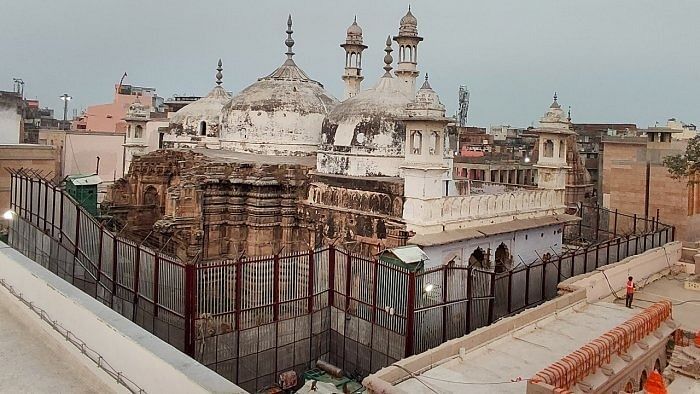
Muslim body Anjuman Intezamia Masjid Committee on Thursday approached the Supreme Court within hours of the Allahabad High Court's order which allowed the Archeological Survey of India to conduct a scientific survey of the Gyanvapi complex.
It contended that the HC's order is liable to be set aside on account of "grave risks posed by such an exercise which may have consequences throughout the country".
Citing "extreme media coverage and communal undertones of the entire issue" when a commissioner was appointed for a survey last year, the plea also claimed such an examination was "absolutely" against the provisions of the Places of Worship (Special Provisions) Act, 1991, which mandated maintaining the character of the religious places as prevailed on August 15, 1947.
The plea was mentioned before a bench presided over by Chief Justice of India D Y Chandrachud, which agreed to list it for hearing.
Advocate M Nizamuddin Pasha mentioned the matter before the bench on behalf of the committee.
"I have emailed the Special Leave Petition...let them not carry on (the survey)", Pasha submitted.
To this, the CJI replied, "We will have a look at it right away."
The Anjuman Intezamia Masjid Committee sought a stay of the HC's order passed by a bench of Chief Justice Pritinker Diwaker.
One of the parties from the Hindu side has also filed a caveat in the apex court saying that no orders be passed without hearing them in the matter.
The HC on August 3 dismissed its plea against the July 21 order of the Varanasi Court for the survey to ascertain if the mosque was built on a pre-existing temple.
In its petition, the mosque committee said the High Court has gone into the nature of the exercise proposed to be conducted by the ASI and has limited the extent and wide nature of the order passed by the District Judge. "Howsoever well-intentioned such consideration may have been, the question before the High Court was not whether the techniques of the ASI are invasive or non-invasive but rather whether such an exercise, in a suit filed in 2021, given its sensitivity and orders passed by this court could at all be allowed," it said.
The petitioner cited May 17, 2022 order by the SC after a Shivling was claimed to have been found. The court had then asked the authorities not to restrain or impede the access of Muslims to the Gyanwapi Mosque in Varanasi, or its use, for performing Namaaz and religious observances, in any manner.
The Muslim side had filed the plea before the High Court on July 25, a day after the Supreme Court halted the ASI survey till 5 pm on July 26, allowing time for the mosque management committee to appeal against the district court's order.
In its decision pronounced on Thursday, the HC said the Varanasi Court was justified in ordering for ASI survey of the premises. "Scientific survey is necessary in the interest of justice," it said.
A Varanasi court had earlier directed the ASI to conduct the survey, including excavations, wherever necessary, to determine if the mosque was built at a place where a temple existed earlier.
District judge A K Vishvesh, however, had ordered the mosque's wazookhana, where a structure claimed by the Hindu litigants to be a Shivling was found during the survey in May, 2022, was not be part of the survey, as the Supreme Court had earlier ordered protecting the spot in the complex.
The district court had then directed the ASI to submit a report to the court by August 4, along with video clips and photographs of the survey proceedings.
The Hindu side claimed Kashi Vishwanath temple at Varanasi, one of the twelve Jyotirlingas, was first destroyed by the army of Qutb-ud-din Aibak, in 1194 CE. In 1669 CE, Aurangzeb again destroyed the temple and built the Gyanvapi Mosque in its place. The remains of the erstwhile Temple can be seen in the foundation, the columns and at the rear part of the mosque.
